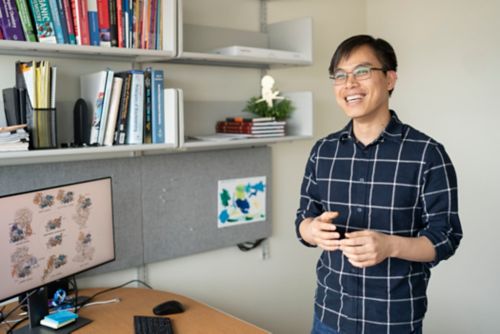St. Jude Family of Websites
Explore our cutting edge research, world-class patient care, career opportunities and more.
St. Jude Children's Research Hospital Home

- Fundraising
St. Jude Family of Websites
Explore our cutting edge research, world-class patient care, career opportunities and more.
St. Jude Children's Research Hospital Home

- Fundraising
Hai T. Dao Lab
Developing novel chemical biology tools to study abnormal chromatin processes that underly numerous diseases
About the Dao Lab
Despite having the same genetic makeup, the approximately 37 trillion cells in the human body can be divided into 200 different cell types that perform a wide variety of functions. The organization of genomic DNA into chromatin is the catalyst for this diverse cell identity and function, and abnormal chromatin processes can cause numerous diseases, including cancer. Our research develops novel chemical biology tools to study epigenetic regulations in both normal and disease states to advance therapeutics.

Dao Lab research summary
Chromatin regulation involves multi-step chemical reactions that often result in the dynamic reorganization of a chromatin’s structure, which impacts the regulation of gene expression. Aberrations in chromatin-templated processes, such as transcriptional misregulation, are the underlying cause of cancer and many other diseases. Our lab uses chemical probes, engineered enzymes, and synthetic chromatins to dissect and manipulate these processes and understand their role in normal and disease states.
The research in our laboratory aims to enhance our understanding of the structure and function of atypical chromatins that underly a number of diseases. The use of synthetic chromatin has the potential for broad application in many areas of investigation, including DNA modifications, histone post-translational modifications, and transcription regulation. Our work strives to build platforms to study chromatin processes in vitro with the long-term goal of building the entire regulatory gene system to understand the cause-and-effect relationship between aberrant chromatins and disease.
The other area of research in our laboratory involves the development of chemistry-based technologies to dissect the biological processes in cells. As part of this line of scientific inquiry, we explore the role of enhancer-promoter communication in gene expression regulation. Developing chemical probes to target the enhancer-promotor communication and modulating that interaction may illuminate potential therapeutic targets for diseases. Our chemistry-based approach complements a traditional genetics-based approach to understanding disease, allowing for a rapid way to perturb and modulate the biological system.
Dao Lab selected publications
This is a brief highlight showing the publications on the page.
Contact the Dao Lab
We’d love to hear from you. If you have any questions or inquiries please get in touch with us.
Hai T. Dao, PhD
Assistant Member
Department of Chemical Biology and Therapeutics
MS1000, Room E9056
St. Jude Children’s Research Hospital
Memphis, TN, 38105-3678 USA
Follow Us

Memphis, TN, 38105-3678 USA GET DIRECTIONS